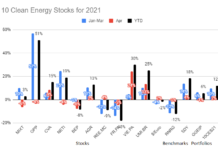This article is part of a series on the WGA Energy Efficient Buildings Workshop.
After arriving slightly late (a gunman had been shot by state troopers outside his office the day before.) Bill Ritter kicked off the workshop with his thoughts on energy efficiency. Other than the Governator, I don’t know of any other state governor in the US who understands renewable energy as well as Governor Ritter. And he’s dedicated to learning more; when I attended a fundraiser early in his campaign last year, he had not yet heard about plug-in hybrids, but in a more recent interview (podcast download), it’s clear that he has learned the ins and outs of the industry. Here are some highlights from his speech.
- Has committed to achieving the goal of 20% improved efficiency in Colorado by 2020.
- The United States wastes more energy in production and transmission than Japan uses. (See my articles on ABB and transmission for investment opportunities.)
- If China and India are to embrace Renewable Energy and Energy Efficiency, the United States must lead the way.
Ritter Q&A
Q (Howard Geller): Are you planning to issue an executive order on Energy Efficiency, like Governor Hunstman of Utah?
Ritter: He is not planning an executive order, but he would instead be tacking the problem on multiple fronts, including using the Governor’s Energy Office to promote energy efficiency and Demand Side Management (something I plan to be personally involved in), and that, if we achieve our goal early, he plans to move the goalposts and aim for even more efficiency, as was done with the doubling of Colorado’s RPS.
Q: What can other states do to get legislators on board?
A: (I thought this was particularly insightful. Activists and politicians take note! -TK)
- Education of legislators is essential;
- Get Rural Electric Co-ops (RECs) on board.
- Make sure there are benefits for rural areas. In Colorado, we signed law allowing RECs to take out debt to fund transmission, and allowed some accelerated cost recovery.
Howard Geller (I’ve mentioned him before)
Dr. Geller gave a summary of the progress on energy efficiency in each of the western States, and his presentation was followed by presentations of other speakers from the individual states. I’m including some information from individual state presentations here.
- In addition to Governor Ritter’s commitment to increase energy efficiency by 20% by 2020, Governor Huntsman of Utah has gone even farther, signing an executive order to achieve a 20% increase in energy efficiency by 2015. Other governors are considering this commitment, Governor Richardson of New Mexico, in particular.
- Energy Efficiency is a key part of all state Climate Action Plans.
- Western states are leading in the construction of new Energy Star labeled homes, with Arizona, Nevada, and Texas alone accounting for half of the nation’s total last year, and Energy Star accounting for 71% of all new home construction in Arizona. More than 15% of new homes were Energy Star in California and Utah.
- Arizona calculates that the net economic benefits of it’s Climate Action Plan, which includes both renewable energy and energy efficiency, at $5.6 Billion from 2007-2020. To me, this is important because it shows that the "choice" between addressing climate change and increasing economic growth is a false one. Energy Efficiency allows us to do both.
Rep. Tonya Pullin, Kentucky Energy Committee Chair.
Link to Rep. Pullin’s presentation, (PowerPoint)
Despite Kentucky not having been a "Western" state since the 1800s, Rep. Pullin was invited to the workshop to tell us about a bill she had championed to make a simple change with the potential to produce great results at very little cost. I’ve written about the potential of giving people better feedback about their energy usage before, and I was very pleased to see that politicians are starting to do something about it. A simple $100 indoor electric meter that’s the size of a credit card can allow users to cut their electricity usage significantly by simply letting them know where it is being wasted.
It’s hard to overestimate the giant potential of human behavior to either make well designed systems run awry if they are not designed with real human behaviors in mind, or to make any system perform well above its design if we are just given the right feedback about the effects of our actions. As Rep. Pullin put it, people want to be empowered with information.
During the Q&A, a representative from Seattle Power and light asked her how the indoor electric meter could be justified by a utility that not only had to pay for the meter, but then had to spend another $150 to verify the savings. She responded that her program was just the enabling legislation to allow a utility to do a voluntary trial (which ended up being massively oversubscribed.)
This highlights a problem with utility regulation: by requiring meter-by-meter verification of something which is inherently hard to measure (the effects of human behavior), we prevent implementation of a program that customers not only want (in Rep. Pullin’s experience,) but that is likely to be radically effective because it is nearly impossible to quantify just how effective it will be. At some point, we simply need to decide that there is likely a large benefit to society, and make the (small) investment. When it comes to indoor meters, we have a bad case of analysis paralysis.
Links
WGA Energy Efficient Buildings Workshop series overview.
You can find links to future installments by clicking here.
Investment opportunities in Smart Metering
Energy Efficient Buildings workshop presentations.
DISCLAIMER: The information and trades provided here are for informational purposes only and are not a solicitation to buy or sell any of these securities. Investing involves substantial risk and you should evaluate your own risk levels before you make any investment. Past results are not an indication of future performance. Please take the time to read the full disclaimer here.









